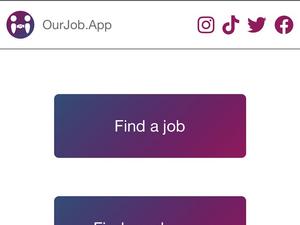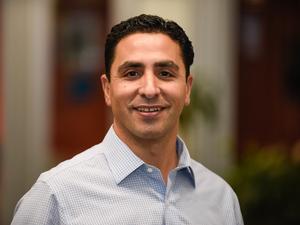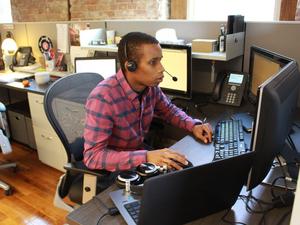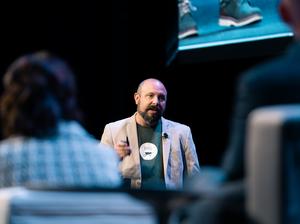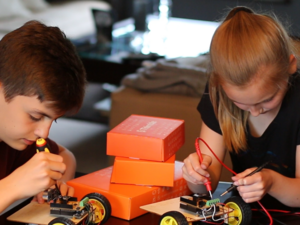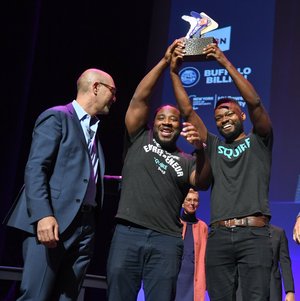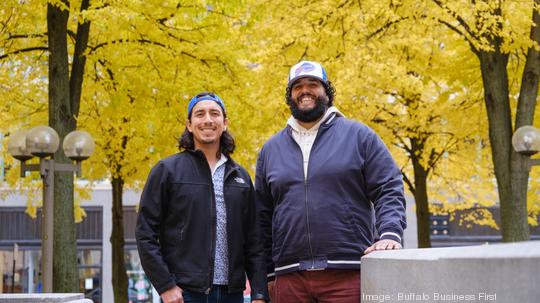
What if you could find a student at your alma mater who’s pursuing the same pathway as you, but they just need a little help along the way?
Arbol, founded by two entrepreneurs in Buffalo, seeks to leverage the power of crowdfunding on behalf of millions of underprivileged college students across the U.S.
But this is not a GoFundMe, known for its marketing power but also a lack of accountability. Arbol will work directly with students and their colleges, validate their needs and then restrict spending to those specific uses.
Donors, meanwhile, will have a tax-deductible way to support people from their hometowns, alma maters, countries of origins or profession.
The company’s co-founders are notable, as well. CEO Favio Osorio was concluding his MBA at Duke University in 2018 when he was recruited to M&T Bank’s Executive Associate Training Program. He is now an M&T multicultural banking program manager.
Arbol President David Gonzalez met Osorio while the two were at M&T but moved on to become vice president of operations and finance at Kangarootime, a 43North startup that has raised millions and hired dozens in Buffalo since it moved here a few years ago. Osorio and Gonzalez plan to dedicate themselves full-time to Arbol.
“To be able to work on an impact company that is driving value for both our investors and our community, it’s a dream come true,” Gonzalez said. “We’re going to use all of our superpowers and skills to make it a success.”
Arbol is still building out its software platform as it works with an initial cohort of students and partners such as the Urban League of Rochester and Buffalo Prep. A student recently completed the first campaign: raising $3,000 to support living expenses for an Urban League scholar who is pursuing a virology degree at a university in Washington state.
The company is raising a pre-seed round through WeFunder, which will be open to public contributions next week. Osorio and Gonzalez say they’ll debut their platform in the first quarter of 2022.
How it works:
- Students will create a profile that explains their history and situation – with specific monetary amounts attached to specific needs that are validated through Arbol’s platform. The money they receive will be restricted to those purposes, and they will also commit to updates along the way.
- The Arbol platform will allow donors to connect with certain constituencies. Through hundreds of interviews, Gonzalez and Osorio said they’ve learned that people are interested in connecting with alma maters, places of origin, hometowns and professions. They can make tax-deductible donations into buckets specified by the campaign.
“We’ve learned that journalists want to give back to journalists, doctors to doctors, entrepreneurs to entrepreneurs,” Gonzalez said. “We are designing a Netflix-style experience where they get recommendations based on different themes.”
The co-founders know there will be questions about who the students are and how the money is spent. But they said modern banking-as-a-service software will enable a highly validated, transparent product.
And by solving that problem, they say Arbol will be a distinctive tool that gives donors a unique perspective. They aren’t just supporting textbook purchases – they are committing to an ongoing story.
“People want to follow along with the journey,” Osorio said. “They want to know they are making an impact.”
Arbol’s co-founders say the market is enormous. Their data shows that only 20% of the approximately 8 million low-income college students in the U.S. will graduate. That’s because about 60% of them struggle to afford food or housing. In the meantime, college students spend about $165 billion (not including tuition) each year pursuing their degree.
“This is a big problem that lends itself to a venture-based model,” Gonzalez said. “These students aren’t asking for a handout. They’re asking for a hand up. They’re not asking for a favor. They’re inviting you into their lives.”
Gonzalez’s grandfather moved from Puerto Rico to Buffalo, where he operated a bodega and worked at Bethlehem Steel. His father got a job at General Motors and Gonzalez ended up at SUNY Buffalo State. He had a middle-class upbringing, but when he graduated, he noticed that his peers were snapping up jobs while he was coming up empty.
“I asked them, ‘What’s happening?’ and they would say, ‘Oh, my dad knew so and so,' ” Gonzalez said. “I am over here busting my butt pushing applications through job portals. I learned that I was at a disadvantage.”
Gonzalez figured it out – working at Delaware North, HSBC and M&T before joining Kangarootime as an apprenticeship of sorts for the day he would found his own startup.
Osorio’s family moved to the U.S. from Peru when he was a child. His green card gave him access to financial support as he moved through college and into professional services. But he’s been troubled along the way by meeting many people whose innate abilities are hampered by their circumstances.
The two friends have seen both sides of the American society and financial services – the advantages it confers and the simultaneous way that lower-income individuals get boxed out of progress.
That’s where their belief in inclusive capitalism – where private sector entities help solve societal challenges – comes into play.
“Normally it’s very binary — if you want to make an impact you go into the public sector, and if you want to make money you go into the private sector,” Osorio said. “Why? Why can’t you build something with both a return and an impact?”
